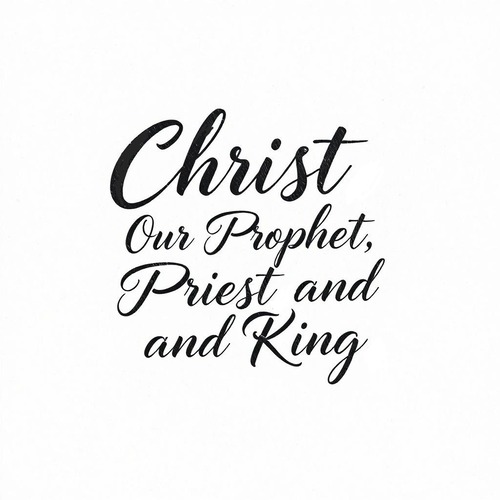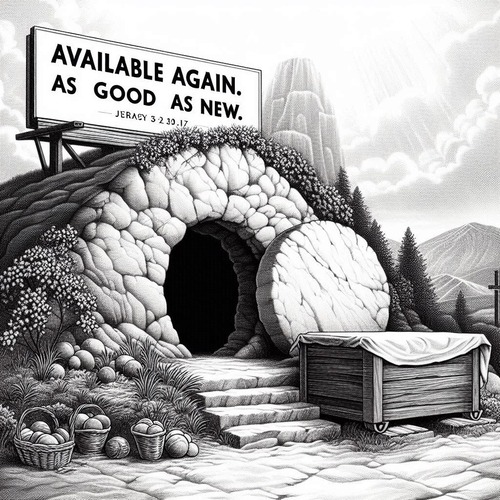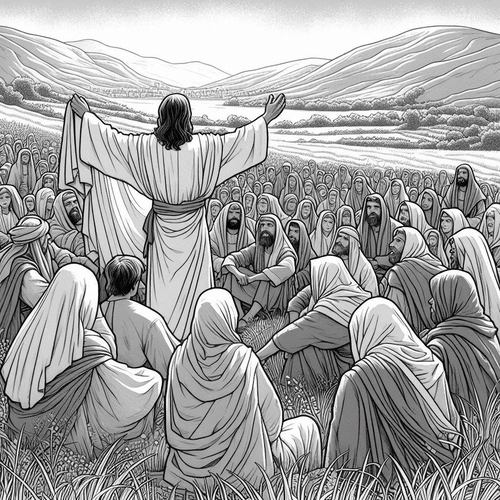The Three Offices of Christ: As Prophet, Priest and King
In the Old Testament, God established three major offices within the Israelite community: prophet, priest, and king. Each office served a distinct purpose in God’s relationship with His people. While there was also a fourth office, that of Judge, which played a crucial role during Israel’s early history, these three primary offices were central to Israel’s spiritual and national life. Remarkably, Jesus Christ not only perfectly fulfils the three offices in His person and work but will also serve as the ultimate Judge at His second coming, bringing all of history to its appointed conclusion.
Throughout redemptive history, these offices were separately held by various individuals, each serving as shadows pointing to their perfect fulfillment in Christ. Understanding these offices helps us grasp the full scope of Christ’s ministry and its significance for our salvation.
Christ as Prophet
In the Old Testament, prophets served as God’s mouthpieces, declaring His truth and will to the people. Jesus stands as the supreme prophet, perfectly revealing God to humanity. His prophetic office was specifically foretold by Moses in Deuteronomy 18:15-18. Christ is the ultimate fulfillment of this prophecy, serving as the prophet greater than Moses who perfectly reveals God’s will and truth to His people.
“Long ago, at many times and in many ways, God spoke to our fathers by the prophets, but in these last days he has spoken to us by his Son” (Hebrews 1:1-2). As prophet, Christ reveals God’s truth not merely through words but through His entire person. He is the Word made flesh, the full and final revelation of God. His teaching ministry, marked by divine authority, brought clarity to God’s law and proclaimed the arrival of God’s kingdom. Even today, Christ continues His prophetic office through His Word and Spirit, illuminating the minds of His people to understand divine truth.
Christ as Priest
The role of priest in the Old Testament centred on mediation between God and man, particularly through sacrifice and intercession. Christ serves as our perfect High Priest, fundamentally transforming this office through His own person and work. In an extraordinary display of divine wisdom, Christ uniquely fulfils both roles of priest and sacrifice—He is simultaneously the one who offers and the offering itself.
Unlike the Levitical priests who had to repeatedly offer sacrifices, Christ offered Himself once for all as the perfect sacrifice for sin. His priesthood is superior because He is both the offering and the offerer, the sacrifice and the sacrificer. As the Lamb of God, He presented Himself as the spotless sacrifice; as the Great High Priest, He offered that sacrifice on our behalf (Hebrews 10:14).
Moreover, Christ’s priestly work continues as He perpetually intercedes for His people at the Father’s right hand. This ongoing ministry ensures our continued access to God and the application of His redemptive benefits to our lives.
Christ as King
Christ’s kingship represents His sovereign authority and rule over all creation, with particular emphasis on His headship over the Church. Unlike earthly monarchs, His kingdom is not geographically limited but extends over all realms—visible and invisible, present and future. While Christ’s kingship has already been accomplished and He currently reigns from heaven, we await the full manifestation of His earthly reign at His second coming, when He will establish His throne in Jerusalem and rule visibly over all nations.
As King, Christ exercises His authority by:
- Calling a people to Himself
- Giving them laws and governance
- Defending them against enemies
- Securing their final victory
His kingly rule bridges both the present and future—He currently reigns from heaven while awaiting the full manifestation of His kingdom at His return, when He will rule visibly from earth. “For he must reign until he has put all his enemies under his feet” (1 Corinthians 15:25).
The Integration of the Three Offices of Christ
The three offices of Christ are not isolated functions but work together in perfect harmony. As Prophet, Christ reveals the way of salvation; as Priest, He accomplishes and applies that salvation; as King, He protects and guides His people in that salvation.
Consider how these offices interact: His prophetic word carries royal authority; His priestly sacrifice establishes His kingly right to rule; His kingly power guarantees the success of His priestly intercession. Each office supports and complements the others, demonstrating the perfection of Christ’s work.
Conclusion
The threefold office of Christ reveals the comprehensive nature of His work on our behalf. As our Prophet, He teaches us God’s truth. As our Priest, He reconciles us to God through His sacrifice and intercession. And as our King He rules and protects us. This complete ministry ensures every aspect of our salvation is secured in Him.
Yet these offices serve not only our present needs but also prepare us for His future role as Judge. As our Prophet, He has clearly revealed God’s will and standards by which we will be judged. As our Priest, He has provided the perfect righteousness we need to stand before His judgment seat. As our King, He is conforming us to His image through His sovereign rule in our lives.
For believers, His coming judgment holds no terror, for the same Christ who will judge us is the one who has perfectly provided for our acquittal. Understanding Christ’s threefold office, therefore, not only deepens our appreciation of His present work but also strengthens our confidence for the future. As we await that day, we rest secure in His complete ministry: taught by our Prophet, cleansed by our Priest, ruled by our King, and being prepared by all three for the day when our Saviour will also be our Judge.
E
The Three Offices of Christ: Related FAQs
How does the concept of Christ’s threefold office appear in the Old Testament prophecies? Old Testament prophecies point to the Messiah’s multiple roles, though not always explicitly as prophet, priest, and king. Isaiah 61 (which Jesus applies to Himself) combines prophetic anointing with priestly ministry. Psalm 110 presents the Messiah as both king and priest after the order of Melchizedek. Deuteronomy 18 prophesies Christ’s prophetic office.
Why don’t we need separate prophets, priests, and kings today like in the Old Testament? Christ’s perfect fulfillment of these offices makes separate human officeholders unnecessary. His prophetic revelation is complete in Scripture, His priestly sacrifice is final and His intercession eternal, and His kingship is absolute. The New Testament establishes different roles (pastors, elders, deacons) that serve under Christ’s authority rather than replacing these offices.
How does Christ’s threefold office relate to our roles as believers? Believers participate in Christ’s threefold office in a derivative way through union with Him. We serve as prophets by testifying to God’s truth, as priests by offering spiritual sacrifices of praise and interceding for others, and as kings by exercising spiritual authority over sin and eventually reigning with Christ. However, our participation always remains dependent on and subordinate to Christ’s primary fulfillment of these offices.
Did Jesus exercise all three offices during His earthly ministry, or did some begin only after His resurrection? During His earthly ministry, Jesus primarily exercised His prophetic office through teaching and revealing God’s will. His priestly office began in earnest with His sacrifice on the cross and continues in His heavenly intercession. While His kingly authority was always His by right, His royal office was fully inaugurated after His resurrection when He declared, “All authority in heaven and on earth has been given to me.”
Are the three offices of equal importance, or is one more significant than the others? While all three offices are essential and work together perfectly, they serve different aspects of our salvation. The priestly office is often considered central because without Christ’s sacrificial death and intercession, His prophetic teaching couldn’t save us and His kingly rule would only condemn us. However, each office is indispensable for our complete salvation.
The Three Offices of Christ: Our Related Posts
Editor's Pick

The Throne-Room Vision: Who Did Isaiah See?
The scene is unforgettable: Isaiah stands in the temple, and suddenly the veil between heaven and earth tears open. He [...]

The Angel of the Lord: Can We Be Certain It Was Christ All Along?
Throughout the Old Testament, a mysterious figure appears: the Angel of the LORD. He speaks as God, bears God’s name, [...]
SUPPORT US:
Feel the Holy Spirit's gentle nudge to partner with us?
Donate Online:
Account Name: TRUTHS TO DIE FOR FOUNDATION
Account Number: 10243565459
Bank IFSC: IDFB0043391
Bank Name: IDFC FIRST BANK






